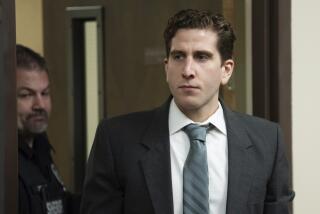Now the Media Are ‘Too Objective’ for Shapiro
The usually unspoken but omnipresent issue of race sent the media manipulators into action at the O.J. Simpson trial Thursday.
Defense attorney Robert L. Shapiro made one of the trial’s most open efforts to manage the news when he challenged the reporting ability of the three journalists who make up the pool of reporters allowed inside the courtroom. He said they had not conveyed what he considered hostile questioning of possible jurors who are African American.
The small pool of reporters was created when Superior Court Judge Lance A. Ito decided to limit the number of journalists observing voir dire, the questioning of jurors. The pool members give descriptions of the courtroom scene to colleagues who only have access to an audio feed of the proceedings. Such pools are a standard practice in the news business. For example, when the President attends church or another event in a limited space, he’s accompanied by a pool of reporters, who fill in their colleagues afterward.
*
Shapiro attended the trial pool’s midmorning briefing, and listened to an account of the questioning of a 71-year-old African American man from South-Central Los Angeles. As is the case with all the pool reports, Linda Deutsch of Associated Press, USA Today’s Sally Ann Stewart and Jim Hill of CNN gave a clear, factual and unadorned account.
That’s not what Shapiro had in mind.
The attorney said he wanted to hear what the “public is getting” from the reporters doing the briefing. Standing in front of the camera, with the poolers off to the side, Shapiro said: “I don’t disagree with the report.” But he didn’t like it, either. If there had been cameras in the courtroom, the viewers’ “impression would have been different” than the one conveyed by the pool reporters.
Prospective black jurors, he said, were “being questioned differently” than white jurors. But when Shapiro was pressed to give examples, he declined to do so, invoking instead former U.S. Supreme Court Justice Potter Stewart’s comment on defining obscenity--that he knows it when he sees it.
“There is a subtlety that is not coming out,” he said. “What you don’t know is how it was said.” The pool reporters, he said, should report “not only the wording, but the body language.”
What was occurring in the courtroom, he said, was “an insidious effort to get black jurors removed. It may be subtle,” he said, but “anyone in the courtroom can see it.”
Afterward, pool member Deutsch commented that it was the first time in her career she had been criticized “for being too objective.”
Meanwhile, co-defense lawyer Johnnie L. Cochran Jr. went up to the press area on the 12th floor to launch a variation of the assault. He stopped near the cameras always on duty there, and began talking to reporters about Deputy Dist. Atty. William Hodgman’s questioning of the man from South-Central.
He objected to Hodgman asking the man if he knew what a polygraph was. “They didn’t ask that question to anyone else,” Cochran said. “It was demeaning.”
Word of the defense’s tactic quickly reached the 18th-floor offices of Dist. Atty. Gil Garcetti. Plans were made for a news conference by Hodgman and co-prosecutor Marcia Clark. “Judging from what I’ve read and seen, we’ve got to do it,” press aide Mike Botula told a few reporters waiting in the hallway.
Hodgman and Clark emerged from an elevator and stood before the cameras. Only Hodgman spoke. He denied accusations of hostile questioning. “This appears to be just the latest in a series of efforts to manipulate public opinion,” he said.
I’d heard Hodgman’s questioning of the south L.A. man, who seemed angry. From what he told of his life, he had good reason to be so.
I’d heard the same story many times from African American men. He’d been mistakenly arrested once, and the police refused to listen to his story. He was released only when witnesses said the cops had arrested the wrong man. Another time, he said, he was driving a new car, showing it off to a relative. The police stopped him, questioning him closely in the apparent belief he had stolen the car.
As I listened, I could hear the old man’s anger welling up as Hodgman bored in, doing his job but showing no mercy as he tried to find out if the man favored Simpson. “You’re getting me riled up,” the man said at the end. “I feel like I’m on trial.”
But other reporters listening in the pressroom had a different impression than I did. They thought the prospective juror was being unresponsive to Hodgman’s questions.
*
That points up the wisdom of Shapiro’s suggestion that jury selection should be televised. Court rules forbid showing the jurors, but the camera would show the body language and facial expressions of the attorneys and Judge Ito. This is particularly important when the subject is race. L.A. doesn’t need any disagreements and rumors about whether white prosecutors Hodgman and Clark are being racist in questioning African Americans.
Unfortunately for Shapiro’s credibility, the defense took the opposite position recently when it opposed televising the hearings next month on admitting DNA evidence, another crucial stage in the trial. This untimely defense reversal makes Shapiro more of a media manipulator than an advocate of an open courtroom.
More to Read
Get the L.A. Times Politics newsletter
Deeply reported insights into legislation, politics and policy from Sacramento, Washington and beyond. In your inbox three times per week.
You may occasionally receive promotional content from the Los Angeles Times.










